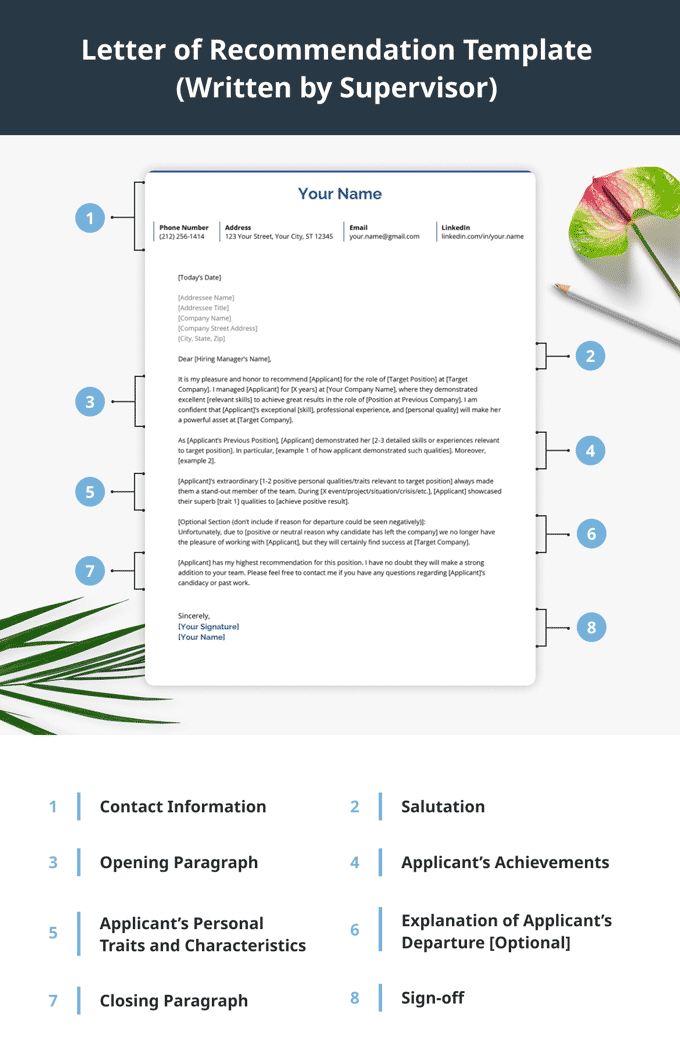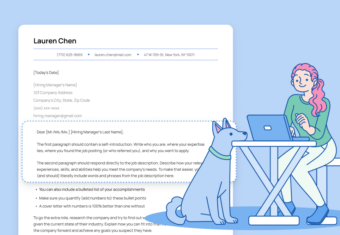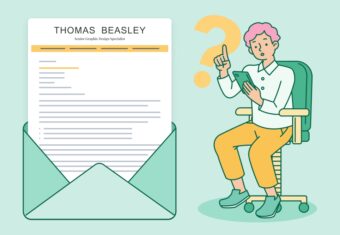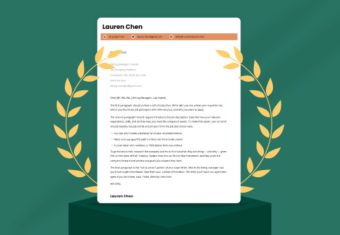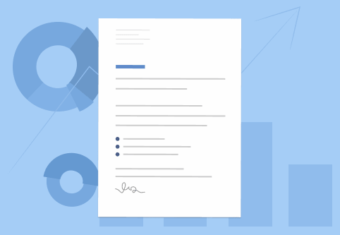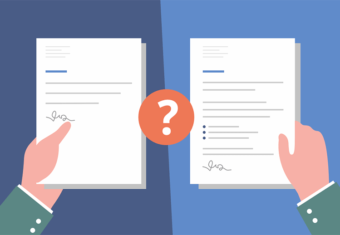Student, college, and teacher letter of recommendation samples
Need to write a letter of recommendation for a student or teacher? The following samples show you how to write a great letter of recommendation for a student applying for a scholarship, or for an undergrad or graduate program. Additionally, we include an example of a letter of recommendation for a teacher applying to a new job.
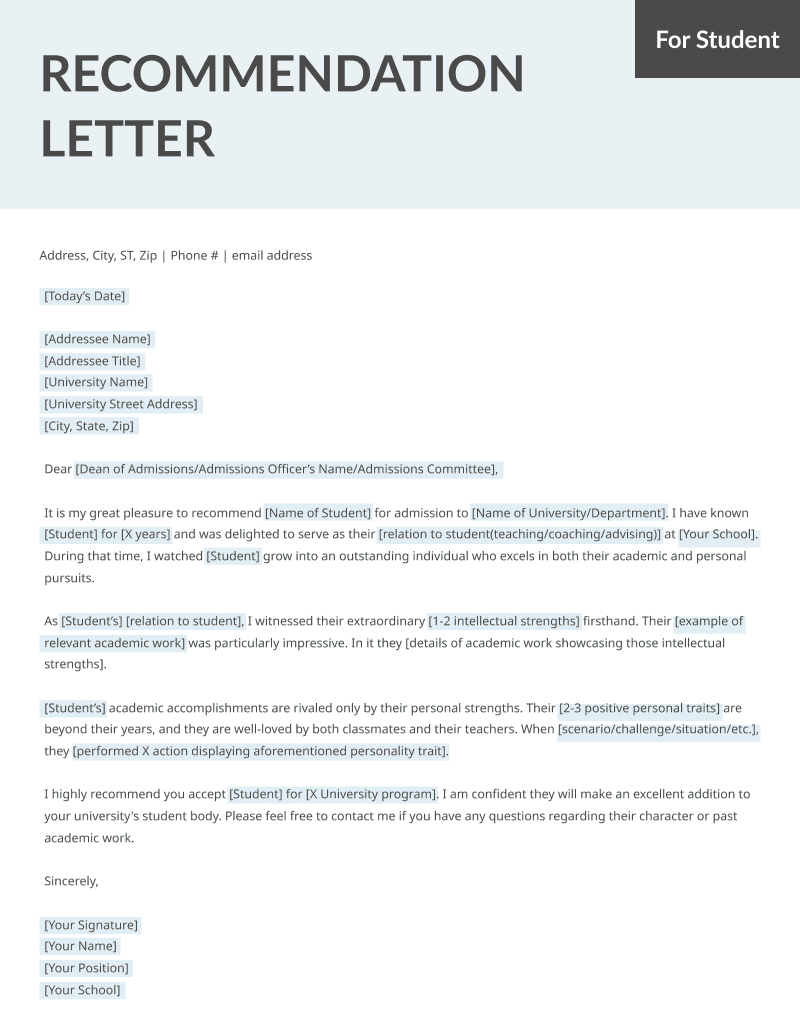
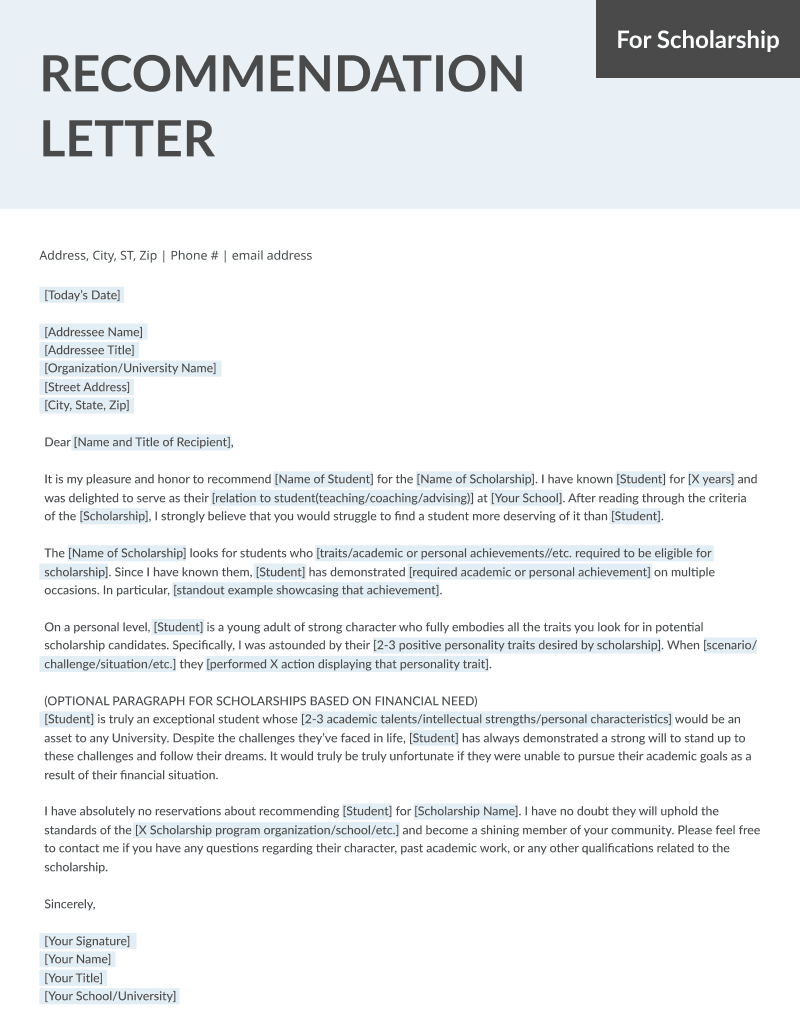
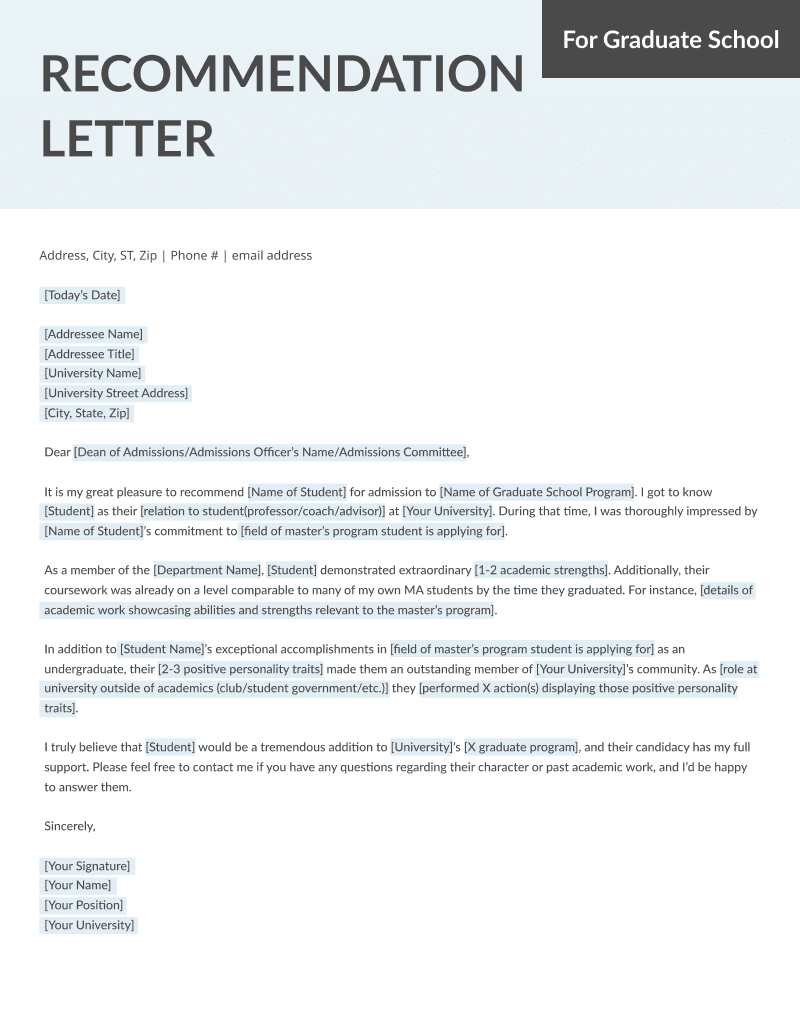
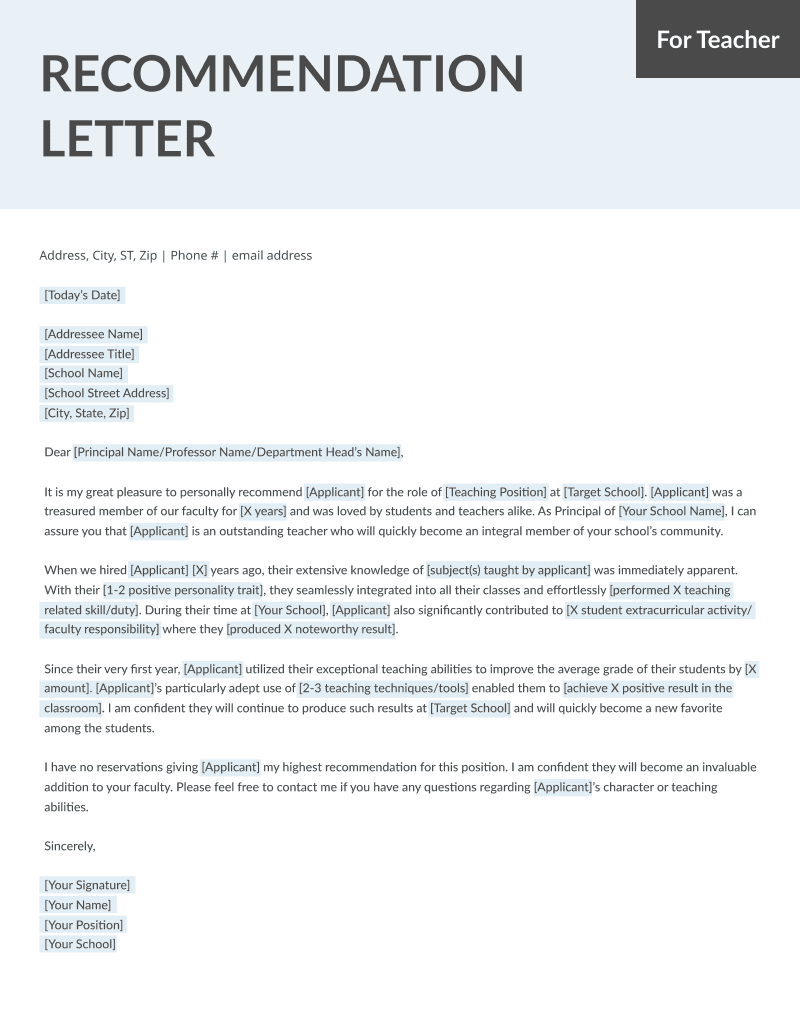
Student and Teacher Templates
View AllLetter of recommendation examples for employment
If you’re looking for a letter of recommendation for an employee, we’ve got you covered with our template below. If you’re providing a reference for a colleague, we also have templates for a letter of recommendation for a coworker or for a friend, as well as a LinkedIn letter of recommendation for your professional acquaintances.
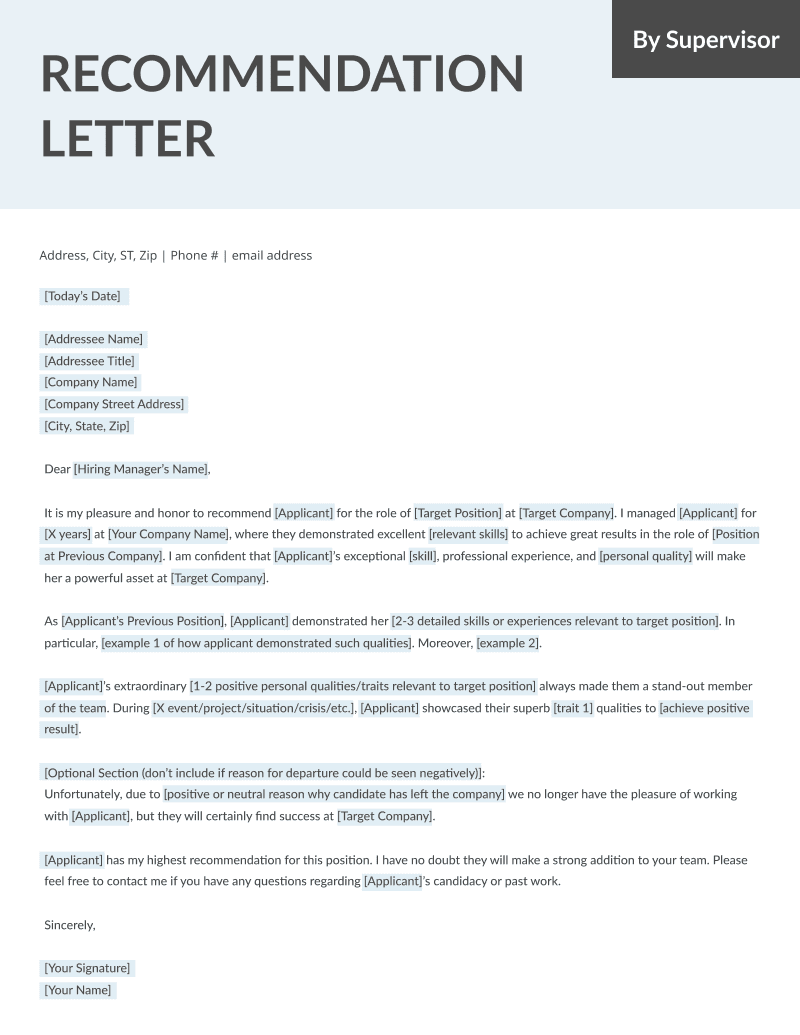
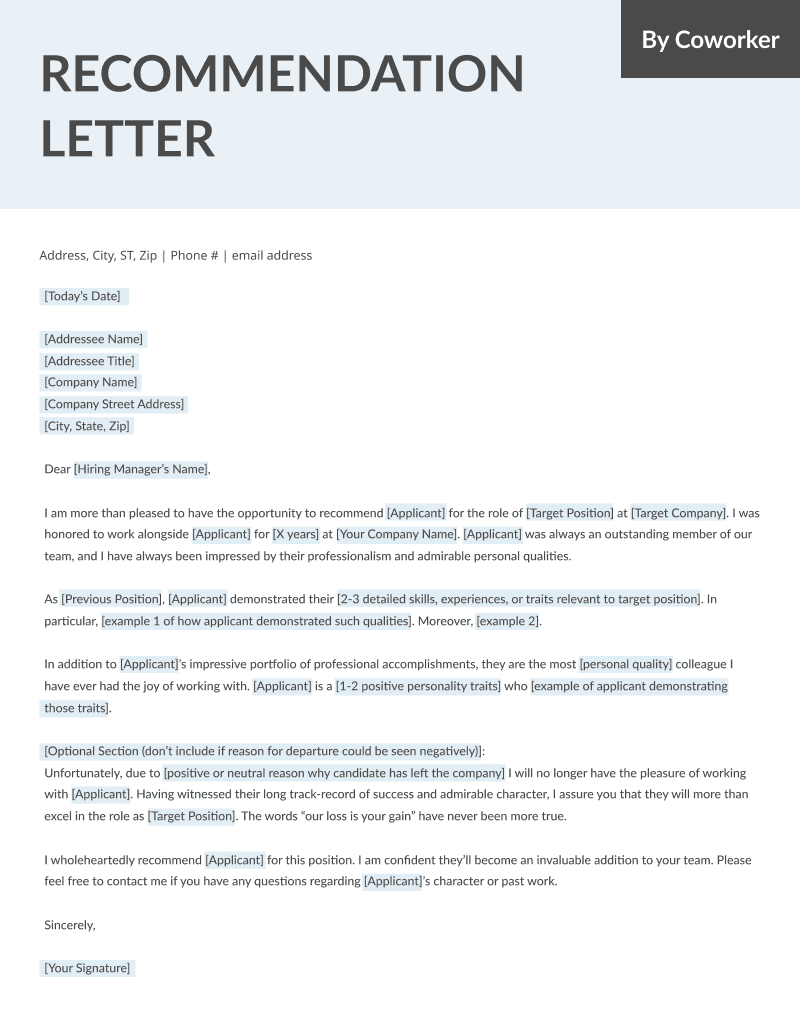
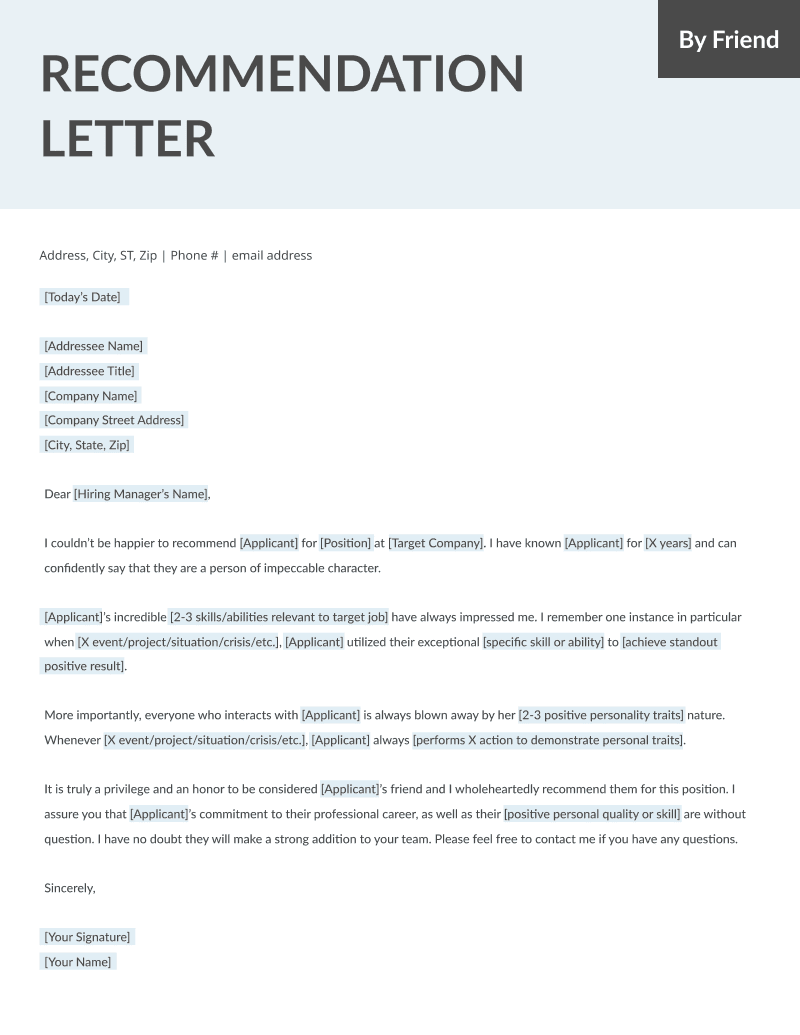
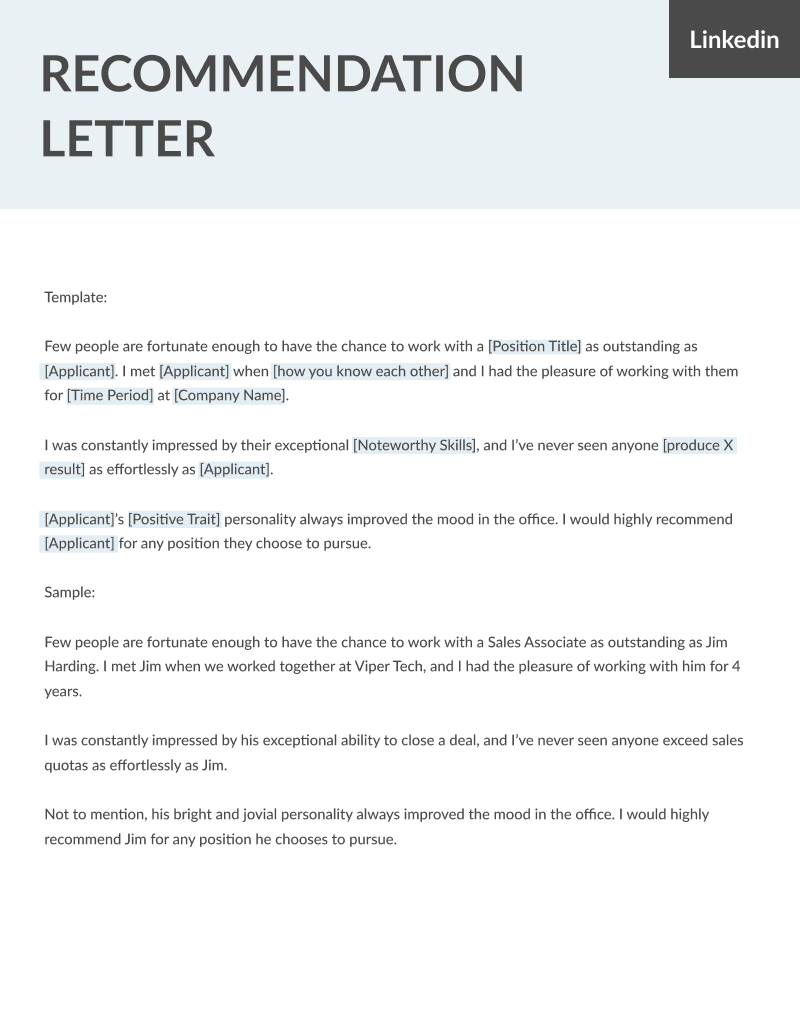
Employment Related Templates
View AllWhat is a letter of recommendation?
A letter of recommendation (or reference letter) is a document in which you attest to the qualifications, experience, and dedication of a colleague, student, or friend to help them get the position they want.
There are various types of recommendation letters, but the three most common ones are written for job applications, university applications, and character references.
When do you need a letter of recommendation?
Here are the situations in which you might require a letter of recommendation, as well as who to ask:
1. You’re applying for university, graduate school, or scholarships
Almost all universities and scholarship programs require at least two recommendation letters as part of the application process. These reference letters should ideally be written by previous teachers or professors who are familiar with your academic achievements and abilities.
Admissions officers and scholarship organizations want to get a better understanding of who students are as a person before making the decision to admit them or award scholarships.
Recommendation letters offer an authoritative outside perspective and help to shed light on qualities that are difficult to fully convey in a resume and personal essay.
It’s also acceptable to have your letter written by a coach, guidance counselor, or academic adviser who can speak to your strengths.
2. You’re applying for jobs that require strong references
For most job applications, writing a cover letter or letter of interest along with your resume is more than sufficient. However, certain industries or companies may require a letter of recommendation in addition to these basic essentials.
Teachers and physician assistants are two such examples of jobs that often need a written reference as part of the application.
Generally speaking, the most convincing reference letters will be those written by a supervisor. In cases where this is impossible (or undesirable), a recommendation from a coworker who is familiar with your work is also acceptable.
3. You want to enhance your job application
If you feel as though your resume and cover letter aren’t particularly strong, a letter of recommendation can give your application the extra boost you need to land a job.
Adding a recommendation letter to your application can be particularly helpful if you have little or no work experience. In situations like these, a character reference from a friend or teacher can make a big difference when it comes to job hunting.
On the other hand, if you’re applying for a particularly competitive job, a strong reference from a previous employer will be the most advantageous.
However, you should wait until an employer requests a reference from you before providing a letter of recommendation. Generally, you should never include references on your resume because employers aren’t interested in seeing them until later in the hiring process.
If you’re preparing a job application, you’ll also need a compelling resume. Using a resume builder can help you save a lot time and spare you the headache of formatting your resume.
Letter of recommendation format
Now that we know what a recommendation letter is and who needs one, let’s go through exactly how to format a letter of recommendation, as well as the best page structure and fonts to create a professional look.
Recommendation letter format guide
No matter who it’s for, including these eight basic sections in your letter will ensure it hits every point needed to make a compelling recommendation.
1. Contact Information
Your name, address, and contact information should go in a header at the top of the page. Alternatively, you can place this information above the date on the top-left side of the page.
Left-aligned under the header should be the current date, followed by the addressee’s name, title, company/school name, and address.
2. Salutation
As with any letter, the first line should address the person or body of people you’re writing to by name and title. Avoid vague salutations such as “To Whom It May Concern,” unless there are no other options available to you.
Check out the first step of our letter of recommendation writing guide for a more detailed explanation of how to craft the perfect salutation.
3. Opening paragraph
Start by expressing your sincere recommendation of the applicant, then explain who you are, your relationship with the person you’re recommending, and how long you’ve known them.
4. Applicant’s achievements
The second paragraph should outline the relevant academic or professional strengths of the applicant. Include one to two specific and detailed examples that demonstrate these strengths.
5. Applicant’s personal traits and characteristics
The third paragraph is all about personality. Include details of the applicant’s positive personality traits, using examples that clearly showcase them.
6. Explanation of applicant’s departure (optional)
This optional section is only used when writing letters of recommendation for employment. It should also only be included in cases when the applicant’s reason for leaving their previous or current company is either neutral or positive, such as relocating for family reasons or outgrowing opportunities at their previous company.
7. Closing paragraph
Reiterate your wholehearted recommendation of the applicant and encourage the reader to contact you with any questions they may have.
8. Sign-off
End your recommendation letter on a professional note, writing “Sincerely,” and then your name underneath. If sending a hard copy, leave some space to sign your signature in ink for an added personal touch.
Letter of recommendation formatting rules
While the most important part of your letter is the content, the appearance of the page still requires some consideration. The alignment, margins, font size, and style can all impact the reader’s impression.
The following simple guidelines will ensure your recommendation letter looks professional:
- Don’t exceed one page in length unless the extra paragraphs and details you’re including legitimately strengthen your recommendation. That being said, anything over two pages is definitely too much.
- Use a 12-point font to maximize readability and economical use of space. Using an 11-point font in order to maintain a one-page length is acceptable but should be avoided when possible. Anything lower than 11 points is too small.
- Stick to basic font styles such as Times New Roman, Arial, Helvetica, and Garamond. Avoid any overly stylistic fonts that could affect readability.
- 1”–1½” is the sweet spot for margins. You could arguably go slightly over or under these limits to fit everything onto one page, but it’s best to avoid anything too excessive.
- Maintain a left alignment throughout the entire page to ensure an organized appearance.
For more specific details on how to format a letter of recommendation, check out our comprehensive business letter format guide.
Important steps before you begin writing a letter of recommendation
Before you start writing your letter, there are a couple things you must do to ensure your reference letter is as compelling as possible.
Ask the applicant for information
Ask the applicant for a copy of their resume, cover letter, personal essay, or any other documents they’re submitting as part of their application. Read through them thoroughly and avoid repeating any of the information mentioned unless it’s particularly important.
It’s a good idea to ask the applicant to fill you in on the role they’re applying for as well as if there are any particular points or examples of their work they’d like you to mention, so you can make your letter as relevant and specific as possible.
Conduct your own research
Do some research on the company, university, or scholarship the applicant is targeting, and customize your letter based on their requirements. If you’re writing a recommendation letter for a job application, reading through the job description is a great way to get an idea of the specifics you should emphasize.
Think about the type of letter you’re writing
Depending on the type of recommendation letter you’re writing, the tone and contents will differ. If you’re a manager writing for an employee, the tone will be much more formal and the letter will contain a lot of detail regarding an applicant’s professional achievements.
On the other end of the spectrum, a character reference from a friend will be written in a more casual tone and focus more on an individual’s personal strengths and characteristics.
Before writing your letter, think about the tone you should use and the details you want to highlight. This gives your letter of recommendation the best chance of leaving a positive first impression.
How to write a recommendation letter
Now that we’ve gotten all the details out of the way, it’s time to write your letter. Following these steps will help you create a compelling letter that’s sure to be an important part of your recommendee’s application.
1. Include a heading for a letter of recommendation
The heading that appears at the top of your recommendation letter should include your name and contact details. Not only does it look more professional, but it conveniently provides the employer or institution with a way to reach out to you, should they need more information.
A heading for a letter of recommendation should look something like this:

2. Use a polite and personable salutation
The way you greet someone when meeting them for the first time has a huge impact on their impression of you. The way you address someone in a letter is no different. So, it’s important to use a polite and personable salutation to start your letter off strong.
A proper salutation should be structured as follows:
Dear + Title + Name of Recipient
The title will vary depending on the individual you’re writing to. For example, if you’re addressing a hiring manager, you would use a general title such as Mr., Ms., or Mx.
Example 1:
Dear [Mr./Ms./Mx.] [Hiring Manager’s Last Name],
On the other hand, if you were writing to a Professor or someone with a PhD, you should use their professional title, such as Dr. or Professor.
Example 2:
Dear Professor [Professor’s Last Name],
Ideally, the applicant requesting the letter should provide you with the name of the person the letter should be addressed to. If not, a bit of quick research on LinkedIn, or the company/university website should yield some results.
What should I do if I don’t know the name of the recipient?
Even if you don’t know the name of the recipient, you should still make your salutation as personable as possible. This means avoiding weak openings that make no attempt to directly address the reader.
For example, you should avoid using “To Whom it May Concern” when addressing the recipient.
Here’s what you should do instead:
Dear [Title of Recipient],
For example, if you’re addressing a university’s dean of admissions whose name you don’t know, write “Dear Dean of Admissions”. Whereas if you’re writing to the hiring manager of a company, write “Dear Hiring Manager”.
How should I address a letter to a body of people or an organization?
When addressing a body of people such as an admissions committee or board of directors you should follow the same principles as those outlined above. The only difference is that the title of the recipient should be replaced by the name of the group or organization.
Here is the exact formula:
Dear [Name of Group or Organization],
Here are some specific examples to give you a better idea of how to address your letter:
- Dear Admissions Committee
- Dear Board of Directors
- Dear Rhodes Trust
3. Start your introduction with a punch
The first sentence of your recommendation is arguably the most important because it sets the tone for the entire letter. The best openers are those that immediately express the heartfelt and enthusiastic recommendation of the applicant.
Here are some useful phrases you can use to write a strong first sentence:
- It’s my pleasure to recommend…
- It’s my pleasure and honor to…
- I couldn’t be more pleased to…
- I have absolutely no reservations about recommending…
- I wholeheartedly recommend…
In comparison, a generic sentence that lacks enthusiasm such as “I am writing with regards to the recommendation for…” is both flat and unconvincing.
4. Establish your relationship
The remainder of your introductory opening paragraph should be devoted to describing who you are and your relationship to the applicant. This is an essential step because it establishes the relevance of your letter.
If you’ve known the applicant for a good length of time, and are in a good position to evaluate their strengths, then your letter will have a stronger impact. When establishing your relationship, you should include the following information:
- Your position and company/school
- The capacity in which you know the applicant
- How long you’ve known the applicant
By including these details in the very beginning of your letter, the reader understands the context and strength of your recommendation.
5. Give words of praise
Finish your introduction with a sentence or two highlighting some of the applicant’s key strengths or personality traits.
The following examples will give you an idea of how you can write yours:
- During that time, I watched Amelia grow into an exceptional individual who excels in both her academic and personal pursuits.
- Gregory was always an outstanding member of our team, and I have always been impressed by his professionalism and admirable personal qualities.
Don’t worry about going into too much detail. The purpose of these sentences is to round out the opening paragraph, while simultaneously serving as a sneak peek of what’s to come in the body of your letter.
6. Showcase the applicant’s professional/academic strengths
Your first body paragraph should start by mentioning 2–3 of the applicant’s specific skills, talents, or experiences that are relevant to their target job position or college program.
It’s essential that these points are then followed up with detailed and descriptive examples of the applicant’s accomplishments that prove these abilities.
Take a look at the difference between the following two examples from a reference letter written for a project manager:
No details:
- Andrea is great at managing projects.
Specific and detailed:
- Andrea’s in-depth knowledge of Scrum Methodologies helped increase the number of projects completed on time and within budget by 23%
Not only is the second example far more compelling, but it also showcases a professional accomplishment that demonstrates the skills the candidate can bring to a new role.
Whenever possible, include interesting anecdotes about the applicant that demonstrate the strengths and abilities you described. This will create a more personable tone that makes the reader feel as though they’re getting to know the applicant — one of the key aspects of a strong recommendation letter.
7. Highlight the applicant’s personal qualities
The next body paragraph should focus on two or three of the applicant’s positive personality traits and characteristics — specifically those that are beneficial or desirable for the position they want.
One of the primary reasons universities and certain companies request letters of recommendation is because they want to get a more holistic understanding of the applicant. Mentioning just the applicant’s academic or professional achievements isn’t enough to create a persuasive letter.
Instead, include relevant and specific examples or anecdotes about the person that highlight their best qualities. Let’s take a look at some examples:
Here’s an example without supporting information:
- Joyce is a selfless and compassionate person.
Now, here’s an example with specific and detailed supporting examples:
- As a member of Habitat for Humanity, Joyce demonstrated her compassion and selfless nature by providing invaluable mentorship to 20+ underprivileged children.
In case you’re having trouble thinking of compelling ways to describe an applicant’s personality, here’s a table containing some of the best personal qualities to include in a letter of recommendation:
| Adaptability | Energy | Honesty | Resourceful |
| Compassion | Enthusiasm | Integrity | Responsible |
| Charisma | Friendliness | Intelligence | Trustworthy |
| Determination | Generosity | Leadership | Vibrant |
Just be sure that you prove that the applicant possesses the personal qualities you mention with specific and detailed examples.
8. Encourage the reader to accept the applicant
Begin the concluding paragraph by reiterating your enthusiastic recommendation of the applicant.
Use strong, authoritative, and confident language when writing this sentence. Take a look at the following examples:
- I am confident that Jon will make an outstanding member of your university’s community.
- There is no doubt in my mind that Allison will quickly become an invaluable asset for your team.
- It’s my strong opinion that Matthew will be a tremendous addition to the University of Virginia’s graduate program in Theoretical Physics.
Finally, conclude by encouraging the reader to contact you if they have any questions about the applicant.
9. Politely sign-off
Your letter closing should be formal and polite. Use any of the following sign-offs when ending your letter of recommendation:
- Sincerely,
- Regards,
- Best regards,
Sincerely is widely considered to be the best sign-off because not only is it undeniably polite, it also carries a warm, friendly tone. In cases where the closing is more than one word, only the first letter of the first word should be capitalized.
How to ask for a letter of recommendation
Asking for a recommendation letter can seem like a daunting task, especially when you’re not sure whether the person will accept. This guide will show you how to properly ask for a reference letter, as well as who and when to ask.
When should I ask for one?
You should only ask for letters of recommendation when an application specifically calls for one, or when you believe your application would be lacking without one.
The following are examples of when reference letters are required or useful:
- Applying for University
- Applying for Graduate School
- Applying for a Scholarship
- Applying for a job that requests one
- Applying for an entry-level job with little or no work experience
- Applying for a job as a teacher
- Applying to work at a volunteer organization
Who should I ask?
Generally speaking, you should ask someone you have a good relationship with who can also accurately speak to your strengths from a position of authority.
That being said, the best person to ask for a recommendation will depend on what you’re applying for.
A student applying to college or scholarship: Pick a teacher who has taught you for a long period of time and whose classes you performed particularly well in. If you’re applying for a specific major, consider asking a teacher who taught a subject related to your target field.
A student applying to grad school: Ask a professor you’ve had extensive interaction with, such as one from a course that involved a small class size or a lot of discussion. Even if you performed exceptionally well in a large course, if there were 300 people in the class, the professor would be unable to write an effective letter for you.
A teacher applying for a job at a new school: Ideally, you should ask the principal of your previous school because they can write you a letter from a position of authority. However, if you’d rather not ask the principal or feel they don’t know you well enough, asking the head of your department is a great alternative.
A recent grad applying for a teaching job: If you specifically studied to become a teacher in college, then you will have already taught some courses under the guidance of a professor or two. One of these professors will be the best candidate to ask for your recommendation.
Applying to a job with little or no work experience: Ask a friend or extended family member to write a character reference for you. A reference from a direct family member will be seen as “too close to home” and will not be taken seriously by any potential employer.
Applying to a job with experience: The ideal recommendation letter writer, in this case, would be someone who has directly supervised your work, such as a manager. In cases where asking your manager is not ideal, a colleague who you’ve worked closely with is also acceptable.
If you’re still not sure who to ask, use the following formula: pick the person in the highest possible position with whom you have the strongest relationship.
6 tips for how to ask for a recommendation letter
How you ask for a letter of recommendation can be the difference between a person saying yes or no. These six tips will help you ask for a recommendation letter in a way that makes it hard to decline.
1. Ask in person
Whenever possible, always ask for a recommendation in person. The person you ask will appreciate that you took the time to make a personal, face-to-face appeal.
2. Explain your situation
Don’t jump straight into asking for a reference. Start by explaining exactly what you’re applying for so they understand why you’re asking in the first place.
3. Use polite language
Use indirect language to ensure your tone is as polite as possible when asking someone for a recommendation, even if you know the person very well.
For example, don’t say: “Hey, can you write me a recommendation letter?”
Instead, say: “I was wondering if it might be possible for you to write me a letter of recommendation.”
This is by far the most important tip, so pay extra attention to it. In almost all cases, politeness is the most important factor in convincing someone to accept your request.
4. Give them an excuse to say no
In case the person you’re asking is unwilling or unable to write you a letter, always follow up your request with a statement that allows them to easily decline. Don’t put them in an awkward position where they have to directly refuse.
Example: “If you’re too busy with other tasks to write it, I perfectly understand.”
5. Emphasize why you’re asking them
Explain why you chose to ask for a recommendation from them specifically. Many times this will help convince them to accept your request even if they’re busy.
Example: “I understand that you might not have time, but since you’ve taught me for 2 years and are familiar with my work, I believe that no one is more qualified to write my recommendation letter than you.”
6. Express your gratitude:
Tell them how appreciative you would be if they would take the time to write your letter. However, don’t give them the impression that you expect them to accept.
Example: “I’d be so appreciative if you could write a letter of recommendation for me, if you are unable to do so, however, I completely understand.”
In the end, as long as you ask with a polite and sincere attitude, most people will be more than happy to write a recommendation for you.
How to ask via email (with template)
If you’re in a situation where you can’t ask for a recommendation in person, write a request via email. Simply follow the same guidelines outlined in the section above.
If you’re still unsure, we’ve created a professional template for writing a letter of recommendation email request below. Simply copy and paste the template and then fill in your own details.
Subject Line: Request for Letter of Recommendation
Dear [Title + Name of Person You’re Asking]
First of all, thank you for taking the time to read this email and I hope that this request does not cause you any inconvenience.
I am applying for [university program/job position] at [target school/company] and was wondering if it would be possible for you to write a letter of recommendation for me.
As my [relation with requestee], I sincerely feel that no one else is better suited to writing a recommendation and I would truly appreciate any kind words you might be willing to write on my behalf.
That being said, I know that you are extremely busy and if you are unable to find the time to write a letter, I would completely understand.
Sincerely,
[Your Name]
What information should I provide to the person writing my letter?
Once your writer has accepted your request, you need to provide them with as much useful information as possible. This will not only make things more convenient for your writer, but also ensure that they write you the best recommendation letter possible.
Here’s some information you should provide:
- Your resume & cover letter
- Your personal statement (if you’re a student applying for university)
- The name of your target university or company
- A link to the description of your target job or program
- Personal strengths or characteristics you’d like them to focus on
- Specific achievements you’d like them to mention
Click to rate this article
4.3 Average rating


